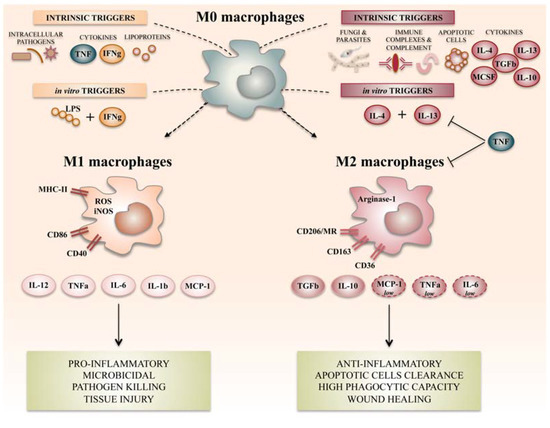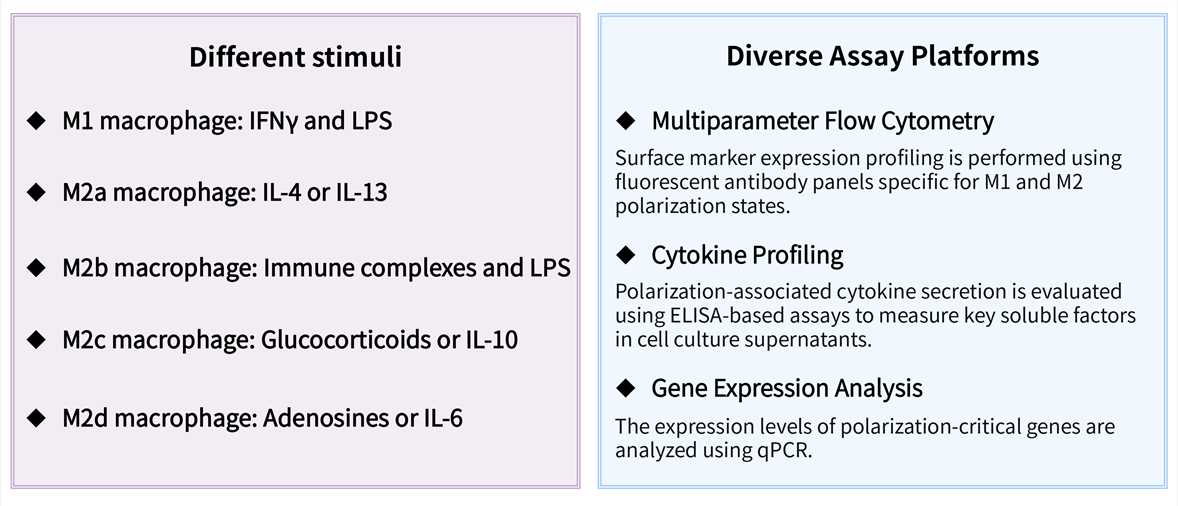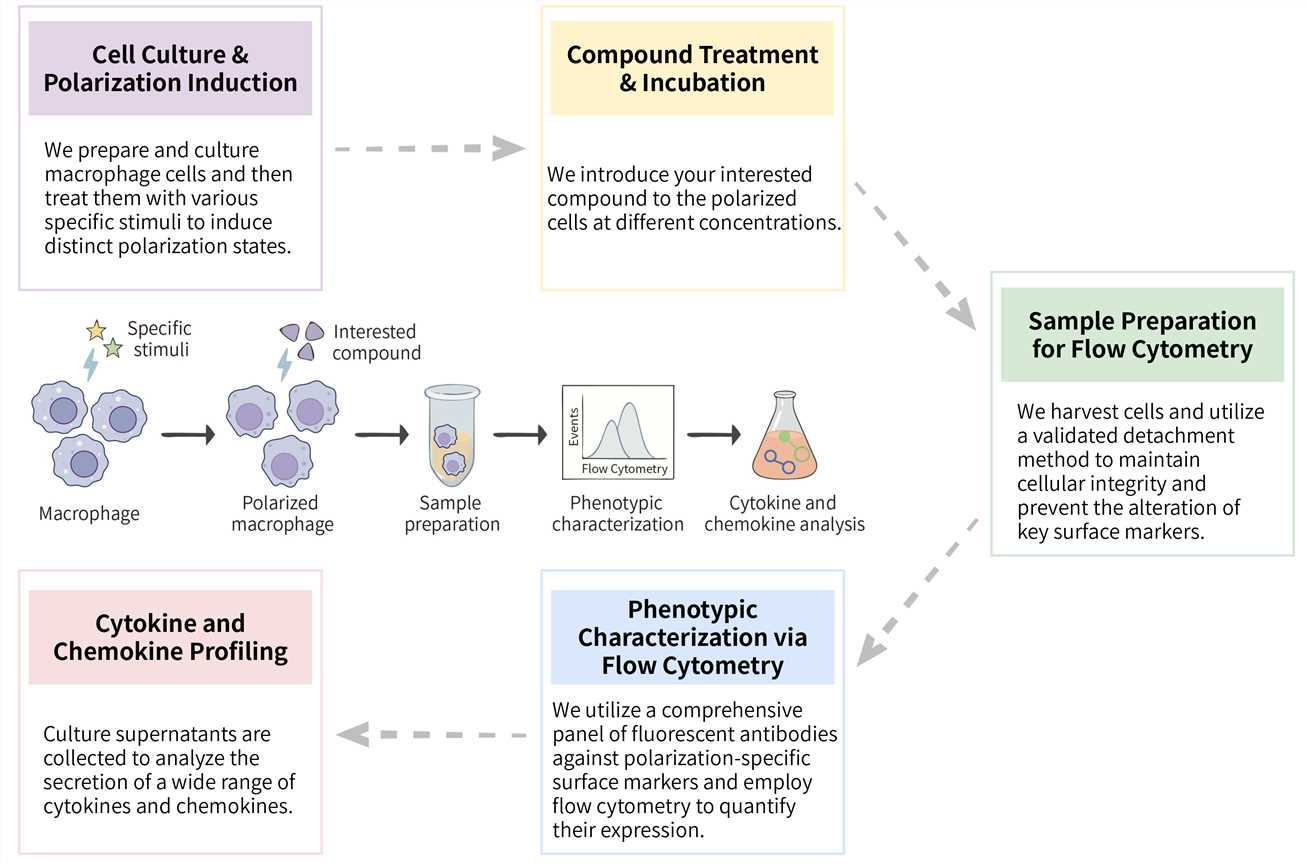The polarization state of macrophages is a critical determinant of their key functions in immune responses, serving as a central node linking innate and adaptive immunity while regulating inflammatory processes and tissue repair. Creative Biolabs' Macrophage Polarization Assay Service employs standardized stimulation protocols and a multi-parameter detection platform to enable systematic identification and functional analysis of M1, M2, and key subtype polarization phenotypes. A major strength of the service lies in its highly reproducible standardized workflows, extensive experience with both human primary cells and cell lines, and precise assessment of dynamic changes across the polarization continuum, effectively minimizing experimental variability arising from diverse cell sources and microenvironmental factors.
Macrophage polarization is a fundamental manifestation of the remarkable functional plasticity exhibited by macrophages, representing their ability to differentiate into distinct functional phenotypes, namely the pro-inflammatory M1 and the anti-inflammatory M2 states, in response to specific microenvironmental cues. This process is precisely regulated by a complex array of stimuli, including cytokines (e.g., IFN-γ/GM-CSF for M1; IL-4/IL-10/IL-13/M-CSF for M2), pathogen-associated molecular patterns (PAMPs), and other signaling molecules. Conducting precise macrophage polarization assays is therefore critically important, as it enables the quantitative assessment of macrophage functional status, which is essential for elucidating disease mechanisms (such as chronic infection, cancer, and autoimmune disorders), evaluating immune responses, and developing targeted immunotherapeutic strategies.
 Fig.1 Functional phenotypes of macrophages: distinct polarization states and their activation signals.1
Fig.1 Functional phenotypes of macrophages: distinct polarization states and their activation signals.1
Creative Biolabs' Macrophage Polarization Assay Service employs highly reproducible, standardized protocols to perform phenotypic identification and functional analysis of macrophages, whether derived from primary cells or cell lines. We deliver comprehensive and reliable polarization data, empowering you to gain deeper insights into macrophage functional states within specific disease models or under pharmacological intervention.
To ensure the phenotypic accuracy of our macrophage polarization models, we employ standardized induction protocols. These protocols use specific stimuli to treat primary cells (such as bone marrow-derived or peritoneal macrophages) and directionally induce the target subsets. And then we perform phenotypic validation based on the significantly expressed surface markers and characteristic cytokine profiles of each subset, providing robust data support for your research conclusions.

Required starting materials: To kick off the project efficiently, please supply us with your well-characterized compound, the desired cellular model (e.g., cell lines like RAW 264.7 or primary cells such as bone marrow-derived macrophages), and any existing data on the compound's potential mechanism of action to ensure the best possible outcomes.
Key Steps Involved:

Final Deliverables: The service culminates in a comprehensive data package designed to provide you with actionable insights. Your deliverables encompass the raw FCS files from flow cytometry, quantitative cytokine/chemokine analysis, and a detailed final report.
What is the principal advantage of outsourcing macrophage-polarization assays to a contract research organization (CRO) rather than establishing them internally?
Creative Biolabs is a specialized CRO and we deliver a fully validated, high-throughput platform that is governed by rigorous workflow, thereby minimizing inter-assay variability and obviating the need for resource-intensive in-house method development.
Is your team equipped to handle primary patient-derived macrophages, or are assays restricted to immortalized lines such as RAW 264.7?
Certainly, we possess extensive expertise across the full spectrum of cellular inputs, including primary human monocytes, tissue-resident macrophages, bone-marrow-derived macrophages, and established cell lines.
At Creative Biolabs, our deep expertise in macrophage biology is matched by our unwavering commitment to methodological rigor. We recognize that subtle inconsistencies in sample preparation are a major source of contradictory results. Therefore, our assays are built upon strictly standardized protocols specifically designed to control for this intrinsic variability, which guarantees that the data you receive is not only accurate but also consistently reproducible, forming a solid foundation for your critical decisions.
"The quality control on their sample prep is exceptional. Using Creative Biolabs' Macrophage Polarization Assay Service in our research has significantly improved the consistency and reliability of our phenotypic data, which was a major bottleneck for our program. " Dr. L* M***, Academic Research Group.
"We needed to quickly screen a large number of compounds. The high-throughput capabilities of Creative Biolabs' platform facilitated our drug discovery efforts immensely, and the detailed reports made data interpretation straightforward and efficient." Dr. R* S***, Pharmaceutical R&D.
"Compared to our previous in-house methods, Creative Biolabs' service provided a more granular analysis of M2 subtypes, which was essential for understanding our compound's precise mechanism of action." Dr. A* F***, Immunotherapy Startup.
Creative Biolabs' Macrophage Polarization Assay Service offers a reliable and scientifically rigorous solution to a common challenge in drug discovery. By partnering with us, you gain access to a platform specifically engineered for reproducibility, an experienced team of scientists, and an integrated workflow—all delivering high-quality data to support your critical decision-making. We are dedicated to accelerating your research progress and helping you achieve your therapeutic objectives. Feel free to reach out to our team today to begin a conversation and advance your project forward.
Reference
For any technical issues or product/service related questions, please leave your information below. Our team will contact you soon.
All products and services are For Research Use Only and CANNOT be used in the treatment or diagnosis of disease.
 NEWSLETTER
NEWSLETTER
The latest newsletter to introduce the latest breaking information, our site updates, field and other scientific news, important events, and insights from industry leaders
LEARN MORE NEWSLETTER NEW SOLUTION
NEW SOLUTION
CellRapeutics™ In Vivo Cell Engineering: One-stop in vivo T/B/NK cell and macrophage engineering services covering vectors construction to function verification.
LEARN MORE SOLUTION NOVEL TECHNOLOGY
NOVEL TECHNOLOGY
Silence™ CAR-T Cell: A novel platform to enhance CAR-T cell immunotherapy by combining RNAi technology to suppress genes that may impede CAR functionality.
LEARN MORE NOVEL TECHNOLOGY NEW SOLUTION
NEW SOLUTION
Canine CAR-T Therapy Development: From early target discovery, CAR design and construction, cell culture, and transfection, to in vitro and in vivo function validation.
LEARN MORE SOLUTION